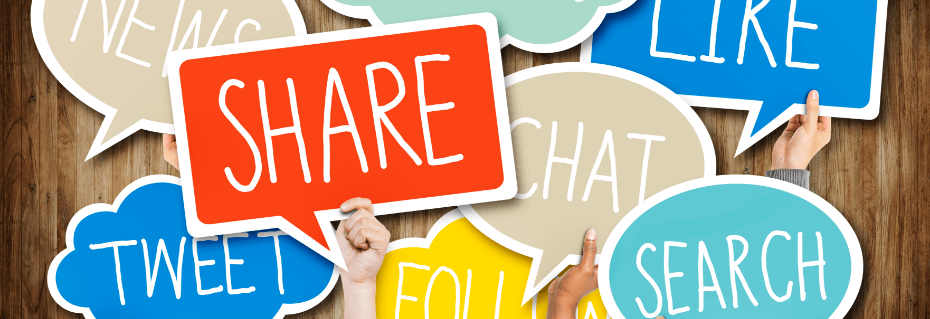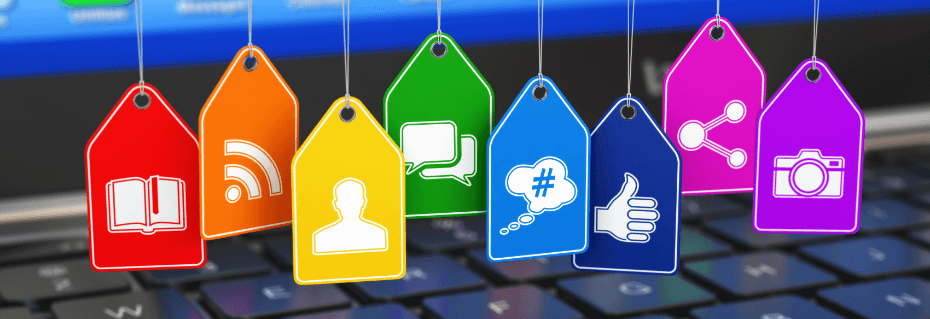In a recent article, we discussed the history of social media on the Internet and its precursors. In this follow-up article, we take a look at the benefits and dangers of social media today, for both personal and business users.
Part 1: Benefits of Social Media
The benefits of social media should probably be considered differently from a personal and business perspective.

3 Personal Benefits of Social Media:
There are several benefits of personal social media use in today’s world, including:
- Cost savings on long-distance personal communications – social media networks and instant messaging services are much cheaper to use than the telephone, with messages generally being free of charge, so keeping in touch with distant relatives and friends, and even those a few miles down the road, has never been more affordable
- Opportunities to meet others with shared interests all over the world and to discuss those interests together with them
- Opportunities to strike up personal friendships and potentially relationships with compatible individuals all over the world
12 Business Benefits of Social Media:
- Establishing a continuity of communications with your existing customer base and other interested followers helps to remind them that you exist and what you offer, and to retain their interest in your products or services.
- Many people associate social media usage with having fun in an informal online setting. If you can cultivate a more informal and friendly voice on social media, you may be able to effectively reach out to people, including potential or existing customers, who prefer a more informal setting for contact with you. Business pages on Facebook quite often get direct messages with enquiries from people who might feel less assured about or even slightly daunted by filling in an official-looking contact form, sending an email, or picking up the telephone to call you.
- Social sharing of new content on your website, such as new articles and new or redesigned pages, is the fastest way to get it noticed. It’s a simple, free, quick and effective way of advertising any new content on your website to people who are already interested in what you do.
- You can also use social media postings to announce upcoming events you want people to attend in a timely fashion. This increases the chance that they and others who pick up on your posts will be aware of them and motivated to attend, as compared with the likelihood if you had simply mentioned the events on the blog or news page within your website.
- Followers of your social media channels who really like what you’ve posted or just like you and want to support you may be motivated to share on content you’ve linked to on your social media entirely off their own bat, thereby giving you instant and free third-party exposure. While in most cases you will see the links in the form of social media shares on the same platform, sometimes people may have their own websites or blogs on which they are motivated to link to something you have shared on your social media channels, thereby giving you well-earned backlinks.
- The use of hashtags in public posts on Twitter and Facebook can help you to attract additional readers and thereby raise your public profile. Some of these readers may then become customers or mention you directly to others who subsequently become customers, while others may link to content they like, improving your backlink profile (a ranking factor for SEO) and further boosting your public profile.

- The use of targeted mentions of other social media accounts belonging to influencers and companies can make those picked out feel appreciated and more likely to mention you, recommend you or make purchases from you in the future.
- Social media can work for lead generation. People who follow you on social media and build up trust in you over time can potentially become clients or refer you to others who may become clients. You can even actively cultivate personal business contacts with your followers by messaging them directly, and ask to add them to your mailing lists.
- Building up social media followers is very much like building up a networking group, only with you in charge. The larger your social media network becomes, the more visible and prominent you appear in the world of social media. Having a larger number of social media followers means you’ll get more likes and comments beneath posts on average than with a smaller number, and can give you the appearance of gravitas and importance in your industry. In business, appearances matter, and social networking for the long haul can build and maintain a most valuable business asset: trust.
- The level of response you get to posts of different kinds on social media can teach you what content your followers actually find interesting. This acquired knowledge can be fed back into future content planning for your website as well as into product development and marketing strategies.
- Posting on social media can also train you to refine and enhance the voice of your brand. It’s not just what you say but how you say it that counts, and this too will be reflected in the kinds of response you get to your posts. In summary, social media can be an effective training ground for brand development, because posting on them forces you to write in a way that represents your brand in a positive light and in a way that resonates with your target market. You can then feed your newly refined brand voice back into the content of your website.
- Regularly sharing your new website content on social media and having others sometimes share it too can indicate to search engines that your new content is interesting and trustworthy. If you keep it up consistently, this should help to boost the visibility of the content you share in those search engines’ rankings for relevant search terms.
Part 2: 13 Dangers of Social Media
We don’t want to alarm you, but the prognosis for social media use is not unequivocally rosy. It all depends on how you use it and what you make of it. 13 is an unlucky number for some, so we picked thirteen things that can go wrong if you’re not careful. Forewarned is forearmed!

- Misunderstandings can easily arise when people express themselves in text, and are all the more likely to occur when the audience is a group or the general public than when the writing is being personally tailored to a known individual.
- Public humiliation is a possible consequence of posting an opinion or joke that jars with the sensibilities of some social groups, a personal revelation that exposes you to judgemental and condemnatory reactions, or a poorly checked purported fact you got from a potentially biased or unreliable third-party source.
- Damage to business and personal reputation can ensue from any faux pas on social media, especially if the post is public. There have been many cases of employers dismissing employees (or rejecting the job applications of prospective employees) after accessing casual comments made on social media by those employees and assessing them as inappropriate or controversial; and much the same principle applies to business owners, with whom other businesses may not wish to associate if they have identifiably posted controversial opinions or other materials in their own names. Even if you keep certain posts private to your registered contacts, there is no technical barrier to their taking screenshots or copy / pastes of your words and re-posting them publicly elsewhere, or passing on rumours about your comments or views to other associates, including business associates.
- Meeting people who may not be who they say they are and could be dangerous – a particularly serious risk for children and teenagers on the Internet at risk of grooming by paedophiles posing as people their own age, but also a theoretical risk for adults seeking to enter into close personal relationships with other adults they know only through the Internet, a medium that gives individuals minded to deception plenty of opportunities to assume false identities, conceal their histories of violence and criminality, and cover up the fact that they are married or otherwise seriously attached.
- Being stalked by malign or dangerously obsessive individuals is a potential risk for high-profile celebrities and other popular or subjectively attractive individuals of posting regular social media updates that indicate their current and future whereabouts, affording opportunities to intercept them. Stalking with a view to confrontation, the issuance of threats or the commission of actual acts of harm is also a risk for anyone who represents a controversial organisation or point of view on the Internet, including politicians and CEOs of large companies.
- Marketing that backfires: messages put out casually through social media might not capture the right tone to attract your target market of clients, so it is advisable to consider carefully any potential negative impacts of your messaging in every event.
- Unhealthy obsessive usage of social media is a potential danger for individuals who have developed a psychological need for affirmation of the self through attaining likes and numbers of online friends or followers. In some cases, this may also manifest in a behaviour of compulsive self-portrait photography for the purposes of social media posting, a practice encouraged by social media sites like Instagram and to a lesser extent Facebook. In extreme cases, this can become an unhealthy substitute for and distraction from the leading of meaningful personal relationships in daily life.
- Wasting time is arguably a risk of all leisure activities, online and offline, including online games and other computer games; but it is worth bearing in mind that both the creation and the consumption of social media postings can eat sizeable numbers of hours per day in those who have built up many connections; and this can be time taken away from more useful activities such as work, physical exercise to stay healthy, and spending good-quality time with close friends and relatives.

- Untrustworthy and misleading content is easy to find on the Internet as a result of the lack of rigorous quality controls on the content published by independent media websites and private bloggers. Sensational but false or deceptive content can attract a lot of followers and social media sharers, and thereby find its way into your newsfeed through the postings of credulous contacts, even if you have not gone out of your way to look for such content. It is intellectually important to retain a sceptical mindset towards any factual claims made on websites that are not held to the fact-checking standards of scientific publications or the conventional ‘quality’ news press. Most so-called ‘alternative media’ channels tend to be covertly or overtly pushing a particular political agenda or perspective on reality, and some should arguably even come with health warnings attached, because over time, and reinforced by feedback from other like-minded sources, the falsehoods and deceptions they spout can seriously adversely impact the reader’s sense of reality.
- Propagation of extremism is easy to achieve through targeted propagandist content on the Internet. Terrorist organisations, religious cults and far-right nationalist groups can all gain plenty of exposure for their causes and views thanks to the many opportunities afforded by the Internet. Sometimes they act in disguise, under the front of seemingly legitimate journalism. It is dangerously easy for vulnerable and impressionable disaffected young people to become recruits to their causes when they are exposed to their Internet propaganda. There have been many instances of those involved in the commission of terrorist acts being found by police after the event to have had a history of browsing and commenting on extremist videos.
- Personal information being stolen by criminals is a theoretical risk with social media usage, with identify theft the prized goal. Criminals seeking to hack your bank account or other online log-in details could look for clues to answers to your secret questions for resetting passwords in the content you post on social media and in your blog. The dangers of fraudulent phishing emails and telephone calls are probably greater, but you would be advised to think twice before giving out your date of birth, your address, your telephone number, the name of your favourite pet, or any other information that could be helpful to a would-be identify thief, on social media.
- Burglary is a risk you take whenever you reveal that you are away from home on holiday, at a conference, or elsewhere, on social media. It is safer only to announce such engagements to your social media followers after you have returned home. Of course, if you have a public engagement to speak or run a course in a set location in advance, it may be impossible for you to cover yourself against an increased risk of burglary during that time except by making provisions for trusted relatives or friends to mind your home in your absence.
- The concentration of power and influence among a relatively small number of companies and writers is a potential consequence of social media campaigns. While this scenario is arguably no different from the conventional advertising landscape in that anyone with money to spend on advertising can get a message across to the masses, there is a risk of distorted perceptions of reality (including commercial reality) arising from the filtering of content through the lenses of the most eager and persistent content creators, not all of whom may be reliable.
Conclusion
Social media collectively are generally a useful communications and marketing tool in the 21st century, but it pays to use them conscientiously so as to avoid the potential pitfalls.
If Social Media has been something you have been experimenting with but you feel that it could be further defined for your business, GWS could help. We have years of experience, working with a range of clients, and know how important it can be to really crack that messaging. Explore our Social Media Strategy Services or give us a call to discuss.

